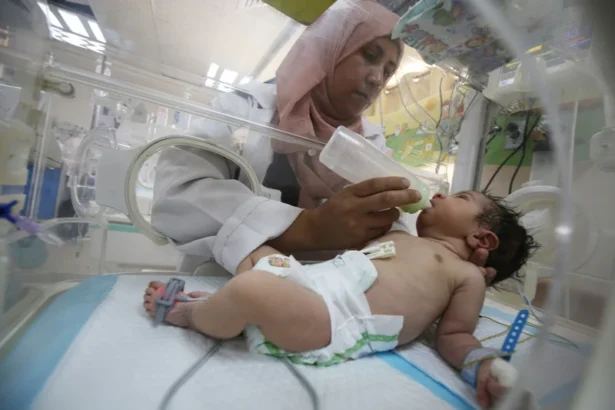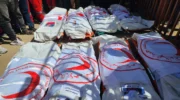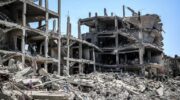Israel’s use of internationally banned weapons has created birth defects in newborns in Gaza and has had devastating impacts on their pregnant mothers.
The effects of these weapons are continuously worsening the health crisis as families face displacement and medical shortages.
Written by Taghreed Ali, Reposted from The Electronic Intifada, Nov. 10, 2024
Samar Hamdan, who fled from Jabaliya in northern Gaza Strip to Deir al-Balah in April when she was four months pregnant, was shocked when her baby girl Noor was born early with a congenital deformity.
“The doctors told me that my daughter has a good chance of survival, but she will live her life without hands and feet,” Hamdan told The Electronic Intifada.
Prosthetics are a medical possibility in the future, she said doctors had told her. They had also said that the likely cause of Noor’s congenital condition were weapons used in Israeli bombings, specifically white phosphorus.
“In the third month of pregnancy, I was exposed to gasses emitted from white phosphorus, which was heavily dropped on us in northern Gaza,” Hamdan said. “This is one of the reasons that may have caused the deformity, according to the attending doctor.”
She also said that Israel’s genocidal violence, which has deliberately targeted Gaza’s health sector, prevented her from getting the usual checks that pregnant women might normally expect.
“I couldn’t undergo ultrasound scans to detect such conditions before birth,” Hamdan said.
Dr. Hatem Edhair, head of the neonatal unit at Nasser Medical Complex in Khan Younis, told The Electronic Intifada that Israel’s continued assault is having a dramatic effect on pregnant women in Gaza and their newborns.
“More than 170 cases of congenital deformities in newborns were recorded during the last third of the ongoing Israeli war on Gaza, a worrying statistic,” he said of cases at Nasser Hospital alone, the largest in central and southern Gaza.
Israel’s use of internationally banned weapons in its attacks on the Gaza Strip has been documented by the rights group Euro-Med Monitor, including the use of cluster and phosphorus bombs.
No way out
At al-Awda Hospital in Nuseirat, northern Gaza, a medical team fought for months to save the life of Ahmad al-Masri, a baby who was born with a congenital condition known as hydrocephalus (a build-up of fluid in the brain).
Ahmad was born prematurely at seven months, weighing just 1,400 grams. His mother, Safaa, was unaware of her baby’s deformities until he was delivered via cesarean section after she went into labor on 13 September. She gave birth two days later.
“The doctors informed me that my baby’s condition is critical, and most babies born with this condition don’t survive because there is no treatment for such cases in Gaza,” she said in an October interview.
In November, and as a result of Israeli attacks on al-Awda Hospital, Ahmed was released, with doctors saying they could no longer offer the care he needed and that the situation at the hospital was too dangerous.
Safaa is now, she said, hoping for a permit to take her son to Egypt. But he is just one of an estimated 14,000 patients in need of treatment outside Gaza, which has been all but hermetically sealed since Israel seized Rafah in early May and stopped any movement of people from Gaza.
“My child is waiting to travel to Egypt for treatment, but the only crossing for travel is closed, which threatens my child’s life, as his condition worsens day by day,” a distraught Safaa said.
Dr. Wissal Abu Laban, a pediatric consultant at al-Awda Hospital, said the number of miscarriages and congenital deformities since Israel launched its genocide last year has shown a “noticeable increase.”
One of the primary causes of these deformities, she added, “is the inhalation of toxic gasses from Israeli bombs, in addition to other factors such as exposure to X-rays and taking medications without medical consultation.”
And with Gaza’s healthcare sector in ruins, there is little help for such babies.
“Due to the lack of medical resources in Gaza and the continued closure of crossings, many children born with congenital deformities die because they are unable to travel for treatment,” Abu Laban said.
Devastated health sector
Safaa said her house in Rafah’s Masbah area was bombed late at night without warning in March.
The attack left her buried in rubble for three hours before she was rescued.
“I was inhaling gasses emitted from the missiles that struck the house, almost suffocating,” she said.
According to The Lancet, a British medical journal, Gaza is suffering a “staggering” rise in premature births, “often triggered by the chronic stress of displacement, malnutrition, and the trauma of witnessing air strikes.”
“The near-total collapse of the health care infrastructure, coupled with the lack of access to essential medical services, has resulted in a tragic surge in preventable maternal and neonatal deaths,” the authors found.
Dr. Husam Abu Safieh, the director of the Kamal Adwan Hospital in Beit Lahiya in northern Gaza, said that during the last six months of the first year of the war in Gaza, his hospital had received 30 cases of newborns with various congenital deformities.
“The deformities affecting the newborns vary. Underdeveloped lungs and skull, hydrocephalus, and deformities in the digestive system,” he said in an interview in August.
Abu Safieh – whose son was killed as Israel troops besieged the hospital late last month but who is determined to stay – attributes these deformities to Israel’s use of banned weapons in its aggression, as well as the lack of adequate health care for pregnant women due to the long siege in northern Gaza, which has been completely cut off from the rest of Gaza since the beginning of October.
Sanaa Sidam, whose house in Jabaliya was destroyed in an Israeli bombardment, was shocked when her son Karim was born on 13 July weighing 2,300 grams and suffering from congenital heart and lung deformities.
The baby is receiving medical care at Kamal Adwan Hospital, but his condition is critical, she said doctors told her.
“During my pregnancy, I was displaced more than seven times. Each time we evacuated quickly under continuous Israeli bombing,” Sidam said.
“There is widespread fear among pregnant women of miscarriages at home due to heavy bombardments and their inability to reach medical facilities.”
Taghreed Ali is a journalist based in Gaza. Read more of her work here.
RELATED:
- Human rights reports on Israel-Palestine (regularly updated)
- The most precarious place in the world to be a child: Israel’s year of war on children
- In 2023, Israel denied life-saving health care to ‘two Palestinian children a day’ in Gaza
- Gaza’s chronically ill patients are out of medicine, doctors, and hope
- Israel’s epidemic rate of medical permit denial for Gaza’s children
- Israel prevents Gazans from traveling for medical treatment, including children with cancer




